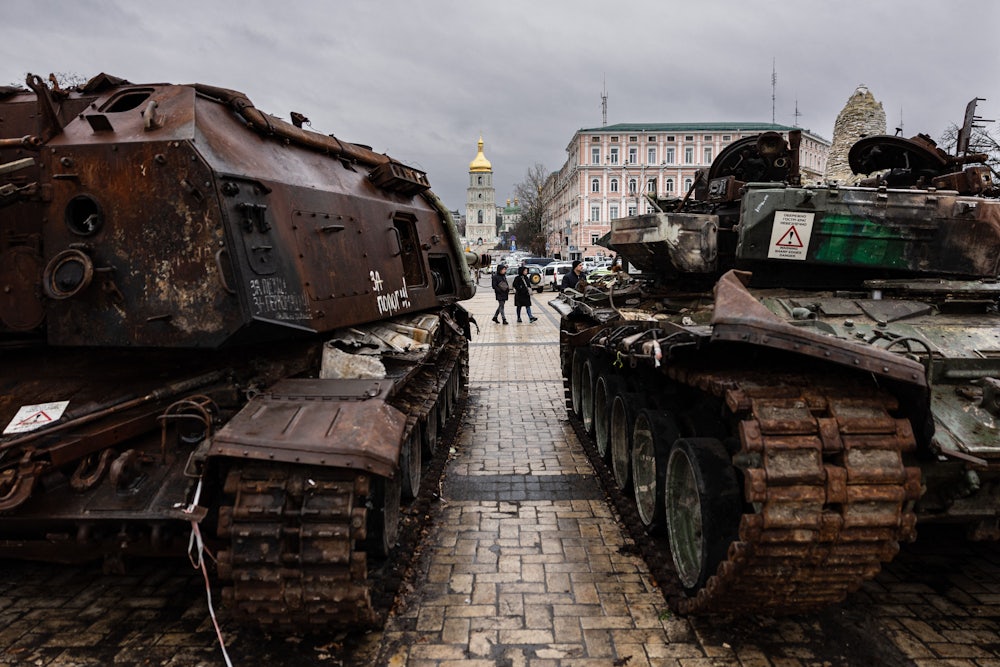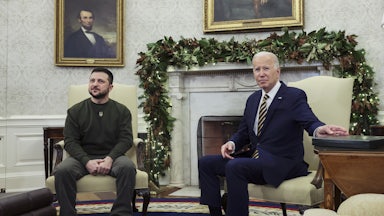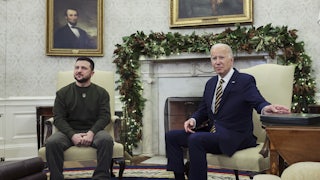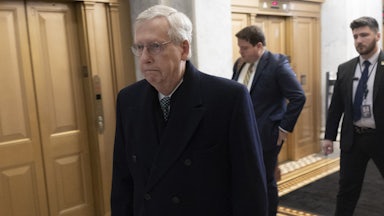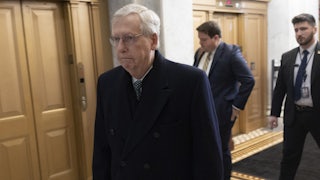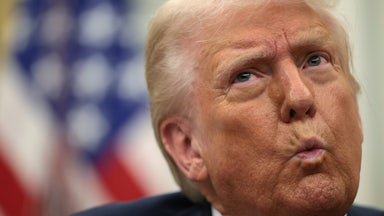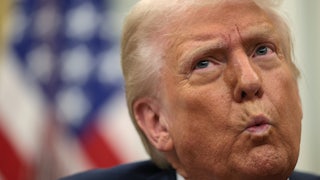A year ago, as Russian bombs began falling across Ukraine and Russian tanks approached the outskirts of the country’s capital, Kyiv, Donald Trump heaped praise on Russia’s leader. “This is genius,” Trump said of Vladimir Putin’s rationale for launching what has since become Europe’s largest conflict since World War II. “Putin declares a big portion of Ukraine—of Ukraine—Putin declares it as independent. Oh, that’s wonderful,” Trump said in a radio interview. “He used the word ‘independent’ and ‘we’re gonna go out and we’re gonna go in and we’re gonna help keep peace.’ You gotta say that’s pretty savvy.” He later insisted that the invasion never would have happened if not for the “rigged election”—implying that his mere presence in the White House (and, presumably, his cozy relationship with Putin) would’ve been enough to stop the bombs from falling.
At that moment in time, Trump’s comments could be said to fall far outside the mainstream, not just in general but within the Republican Party as well. It’s true that Trump was far from alone, but he was very much on the fringes, joined by a handful of fellow renegades such as Marjorie Taylor Greene, Steve Bannon, and J.D. Vance (whose antipathy to the invasion seemed to be based as much on principle as it was on ensuring that Peter Thiel kept sending checks). But most of the Republican Party condemned the invasion. “Vladimir Putin is the aggressor. The Ukrainians are the victims,” tweeted former Secretary of State Mike Pompeo. Senator Josh Hawley said that “the Biden administration should sanction Russian energy production to a halt, and help arm the Ukrainians to defend themselves.” Representative Elise Stefanik, in a rare break with Trump, called Putin a “gutless, bloodthirsty, authoritarian dictator.”
As we approach the one-year anniversary of the invasion, Donald Trump is still a Ukraine skeptic. Talking to reporters ahead of his visit to East Palestine, Ohio, the site of a disastrous train derailment—caused in part by his own deregulatory efforts—Trump tried to draw a contrast between himself and his successor. “I think it’s very sad,” he said, “that you have a president going to Ukraine and you have people in Ohio who are in desperate need of help.”
But Trump is no longer one of the lonely figures on the fringes. Increasingly, many Republicans are vocally questioning American aid for Ukraine. Kevin McCarthy made a promise to end “blank check” support a crucial plank of his bid for the Speakership. As Semafor’s David Weigel noted on Tuesday, “Republicans, whose voters have grown more skeptical about funding Ukraine’s defense, increasingly characterize it as a wasteful, risky, and distracting White House obsession.”
Florida Governor Ron DeSantis, still undeclared as a presidential candidate, parroted the man he will likely be facing off for the GOP’s 2024 nomination. “We have a lot of problems accumulating here in our own country that he is neglecting,” DeSantis told Fox News shortly after Biden’s surprise visit to Kyiv on Sunday. “They have effectively a blank-check policy with no clear, strategic objective identified, and these things can escalate, and I don’t think it’s in our interests to be getting into a proxy war with China, getting involved over things like the borderlands or over Crimea.”
Suddenly, Trump’s bellicose isolationism has become the Republican Party’s Ukraine gospel: More and more Republicans are questioning the purpose of continued support; an end to aid will almost certainly be the party’s consensus position when the primary heats up this spring. (The exception proves the rule: Former Vice President Mike Pence, no one’s idea of a pacesetter, is one of the few Republicans who dare to continue insisting that arming Ukraine is a good policy.)
How did we get here? Many in the GOP are simply following their voters: Republicans have always been more skeptical of Ukrainian aid than Democrats and have grown more so; 40 percent of Republicans believe that America is providing “too much aid” now, up 8 percent from the start of the war, per a late-January Pew survey. Only 15 percent of Democrats hold the same view. Some of it is politics. Pointing to foreign wars as a distraction from domestic priorities is a longstanding trope of American political rhetoric—though it has, more recently, been more common among Democrats.
Naturally, one must appreciate the rich irony of Republicans carping about the money being allocated to aid Ukraine when they have no real interest in using it to actually help Americans. No Republican is currently running on any policy in which the billions being spent on arms and medical supplies would be redirected toward measures that would help Americans in places like East Palestine. Instead, the GOP is still talking about budget cuts and a plan to engineer a debt ceiling standoff in order to eviscerate the social safety net. This is the core of Donald Trump’s twisted form of populism: seizing on the plight of those left behind to advance politically without actually doing anything to reverse their fortunes.
But another reason we are seeing a shift in the GOP’s Ukraine policy is simply that the party’s foreign policy has become so incoherent. At the start of the war, the party agreed on only one thing: The invasion wouldn’t have happened if Joe Biden wasn’t so weak. The implication—made explicit by Trump but not by all—was that having a strong man in office (like Trump) would magically deter Putin from invading his neighbor in the first place. This is appealing because you can’t actually prove a counterfactual—holding that we wouldn’t be in this mess in the first place if a Republican was in the White House is a classic unfalsifiable claim.
A year later, however, the GOP has yet to come up with any sort of policy. Few Republicans are advocating for specific terms that might end the war—none seem to have a plan to deter Russia from launching similar invasions in the near future. The endgame of the war in Ukraine is complex, of course—it’s not a topic that necessarily lends itself to the rhetorical themes of early-stage Republican primaries. But the absence of actual policy is nevertheless striking. The only thing people agree on is that Biden is weak and that the war costs too much. Though somehow, one imagines that if Ukraine had been badly overrun by now their critique might be different; in many ways, Republican rhetoric on this issue has been molded by the relative success of the Biden administration’s alliance with the Zelenskiy government.
Still, the GOP’s current set of Ukraine gripes may be fit for purpose for the time being. Support for the war is ticking downward, but it’s also not currently one of the issues Republican politicians have strongly touted in this early primary period—the largest land war in Europe does not compare to, say, who gets to use which bathroom. But the absence of an alternative idea on how to best help resolve the war from the party that’s urging its hasty end the loudest is notable. For decades, Republicans aligned roughly around the heavy-handed foreign policy principles of neoconservatives. That consensus started to crack after the disaster of the Iraq War, and it shattered after Trump’s rise. But nothing has arrived to replace it. There will be a lot of rhetoric around foreign policy and Ukraine specifically in the upcoming primary—about the cost of the war and the need for “strength.” There won’t be much in the way of ideas, however, merely complaints.
